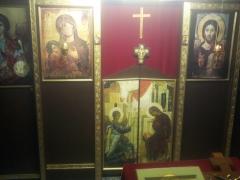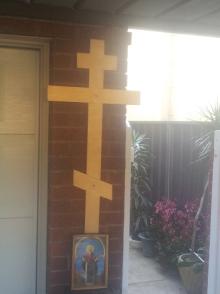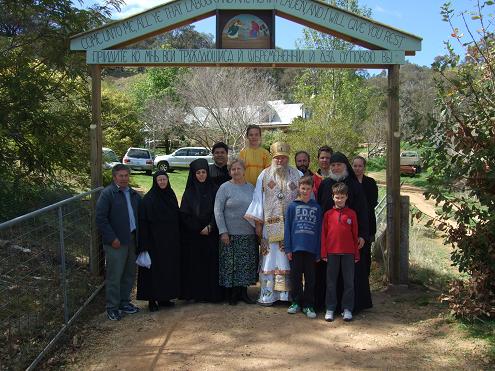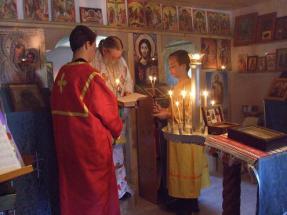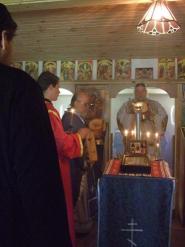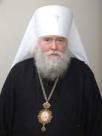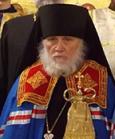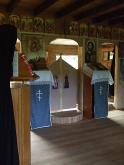Monday, September 29, 2014
Archbishop Andronik’s visits Protection Parish and Tabinsk Icon Community
 On Sunday, 8/21 September, Archbishop Andronik served with Igumen Andrei (Erastov) in Melbourne (Yarraville) at the parish of the Protection of the Mother of God (Guest parish at the Belarusian Church of the Three Martyrs of Vilnius).
On Sunday, 8/21 September, Archbishop Andronik served with Igumen Andrei (Erastov) in Melbourne (Yarraville) at the parish of the Protection of the Mother of God (Guest parish at the Belarusian Church of the Three Martyrs of Vilnius).
On Saturday, 14/27 September, for the feast of the Exaltation of the Precious Cross of our Lord, Vladyka also served in Melbourne, with Igumen John (Smelic).
After the Divine Liturgy, parishioner Dimitri Kichakov was awarded a gramota for his dedicated expert work for the glory of God at both the parish of the Protection and at the monastery of the Annunciation. May God grant many years to servant of God Dimitri!
On Sunday, 15/28 September, Archbishop Andronik served at the community of the Tabinsk Icon of the Mother of God in Dandenong. In his sermon, Vladika urged the parishioners to stay true to the True Orthodox Church of Christ.
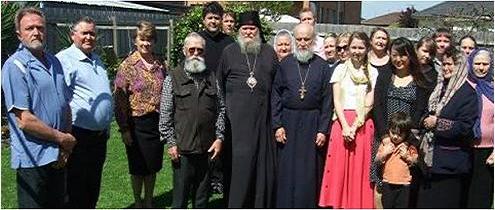
Sunday, September 28, 2014
Archbishop Andronik’s visit to Sydney parish of St John of Kronstadt
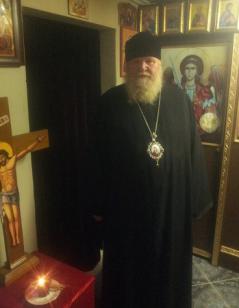 On the 24th of September, Archbishop Andronik visited the parish of St John of Kronstadt in Sydney, whose rector is Fr Nebojsa Mirkovic.
On the 24th of September, Archbishop Andronik visited the parish of St John of Kronstadt in Sydney, whose rector is Fr Nebojsa Mirkovic.
The parish was spiritually strengthened by the visit of Vladika and his edifying discussion.
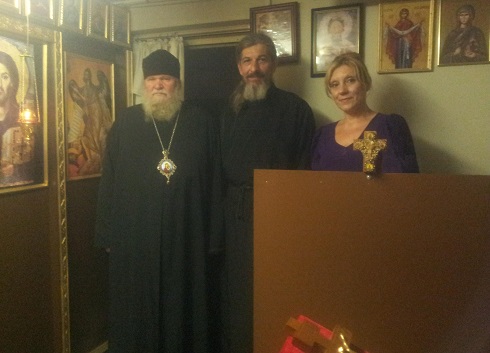
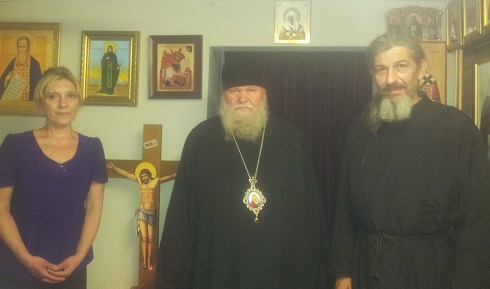
Above: View of the Iconostasis
Right: The entrance to the Church.
See also Internet-Sobor and Fr Nebojsa’s facebook page
Wednesday, September 24, 2014
Secret sin, secret repentance, open slander, glory from God
This summarises the life of St Theodora of Alexandria.
Young Theodora was happily married, which upset the enemy of all good, the devil. He tempted a young man to fall in love with her. The young man was so desperate that he resorted to magic to seduce Theodora. The simple Theodora was tempted by the thought that if she sins during the night, God will not see the sin!
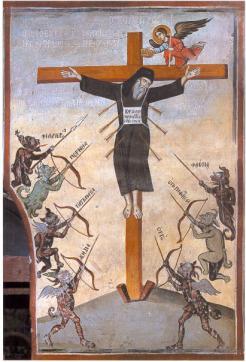 So, Theodora fell into adultery with the young man. Her conscience witnessed it all, and her heart felt no peace.
So, Theodora fell into adultery with the young man. Her conscience witnessed it all, and her heart felt no peace.
St Theodora fell into a second simple-hearted error: She thought God would never forgive her! Running to a wise Abbess she knew, she asked for advice. However, she did not confess her sin clearly, nor receive spiritual medicine from this wise doctor. Instead, she convinced herself that no forgiveness was available, that no healing could ever occur.
Theodora decided she must give up the world entirely and become a monastic in order to repent. So that her husband would not find her in one of the women’s convents, she cut her hair and changed into men’s clothing. She presented herself at the gate of a men’s monastery as “Theodore”, asking to be accepted. Her distressed husband searched, fearing that his beloved wife had left with another man…after several years, God answered his prayers and showed him his wife - but he did not recognise her.
Theodore went through many trials in the ascetic life. The brothers, incited by the enemy of God, quickly started to envy the young “brother”. Because of this they exposed her to unecessary dangers, sending her on errands where wild animals would be sure to attack her. Theodora remained safe, as she never doubted God. She also never exposed which brothers had caused her trouble, keeping her mind set on God and her body set on serving the brethren. Miracles even started to occur, which made her spiritual life evident to all.
…[someone] offended you; do not hate him but rather hate the offense and the demon who contrived the offense. If you hate the offender, you hate a person and transgress the commandment, and what he did in word you do in deed. But if you keep the the commandment, give proof of your love, and if you can in any way, help him so that he can be delivered from wickedness.
Christ does not want you to have hate for anyone, or grief, or anger, or resentment in any way at all or for any temporal reason whatsoever,. And this is thoroughly proclaimed in the four Gospels.
St Maximos the Confessor, 7th century
Finally, on an errand to the city, the devil constructed a sure trap. Monk Theodore did not make it home, and was forced to spend the night outside with his camels and goods. A girl, tempted by the devil, tried to seduce the “monk”, but he was not the least interested. She finally found another man among the travellers, and became pregnant.
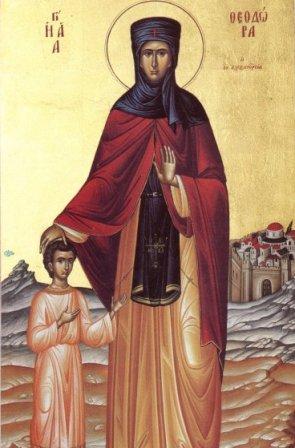 Soon, the girl’s outraged relatives came to the monastery, accusing the “monk” Theodore of raping her! Theodore was evicted from the monastery. When the baby was born, the relatives threw him into the monastery for upbringing, by the “adulterer himself”. Theodore accepted this new obedience just as he had previously accepted all other obediences, for the sake of God and his repentance. Seven years passed. Theodora’s skin was black from the rough conditions. She fed the baby with the work of her own hands. Everyone despised her as a great sinner.
Soon, the girl’s outraged relatives came to the monastery, accusing the “monk” Theodore of raping her! Theodore was evicted from the monastery. When the baby was born, the relatives threw him into the monastery for upbringing, by the “adulterer himself”. Theodore accepted this new obedience just as he had previously accepted all other obediences, for the sake of God and his repentance. Seven years passed. Theodora’s skin was black from the rough conditions. She fed the baby with the work of her own hands. Everyone despised her as a great sinner.
There is no hardship more oppressive to the soul than slander, whether one is slandered in his faith or in his conduct. And no one can disdain it except the one who like Susanna looks to God who alone can rescue in need, as he rescued her, and to reassure men, as he did in her case, and to encourage the soul with hope.
To the extent that you pray from your soul, for the one who spread scandal about you, God will reveal the truth to those who were told the scandal.
St Maximos the Confessor, 7th century
Theodora could have proved her innocence easily - simply by showing herself as a woman. But she did not - she chose to endure hardship, to prove her secret repentance before God for an old sin. Theodora knew well that it is the devil that tempts us - not our circumstances or the people around us:
There was a monk who, because of the great number of temptations said, “I will go away from here.” As he was putting on his sandals, he saw another man who was also putting on his sandals and the other monk said to him, “Is it on my account that you are going away? Because I go before you wherever you are going.”
Venerable Mother Theodora of Alexandria, 5th century
Theodora was by now very experienced in the spiritual life, having endured many kinds of temptation. She instructed her “son”:
Seek my child, the nobility of the soul, for it is truth; that of the body is false. Do not seek honour from men, for this injures one; but rather, seek heavenly glory…Thou art to be sympathetic with all the brethren and help them as much as possible; also thou are to minister unto them that are incapacitated or weak. Do not desire to live by another’s labour. Guard thy mind never to condemn something, whether it is good or bad. When thou art spoken to, lower thy face to the earth and then answer. Never ridicule anyone, especially when they are in misfortune. When thou wilt hear that a certain brother is disorderly, supplicate God to correct his life. Visit and help the sick, and serve the brethren as their servant…
Venerable Mother Theodora of Alexandria, 5th century
Then, “father Theodore” died. The child wailed inconsolably, and attracted the brothers to investigate what was happening. The abbot, in the meantime had a vision of the glory awaiting Theodora in heaven - which also revealed who she really was. An angel commanded him to bring the husband to the funeral. All the brothers shed tears, amazed at the spiritual strength of the Saint, and full of remorse for their previous judgements and false accusations.
The husband remained at the monastery and became an exemplary monk. The child later became a wise Superior of the same community.
And Saint Theodora from Heaven assists all those who struggle with the temptation of slander and false accusations, encouraging them to endure with God, for the salvation of their souls.
Blessed are ye when men shall persecute you, and shall say all manner of evil against you falsely for My sake. Rejoice and be exceedingly glad, for great is your reward in Heaven.
Mt.5:12
Sunday, September 21, 2014
Nativity of the Mother of God
Mary, the Mother of God (Theotokos), whose Nativity the Church commemorates today, was born of her aged parents Joachim and Anna.
O Bride of the Father, immaculate Mother of the Son, and holy and resplendent temple of the Holy Spirit: O most chaste of all creation, most suitable to His ultimate purpose, on this account the universe was created, and by thy birth was the eternal will of the Creator fulfilled.
St Andrew of Crete, 7th century
What is God’s ultimate purpose for us, and how did Her birth fulfill the eternal will? It is our unification with God and our divinization (becoming God-like).
Unless man were redeemed, it would avail him nothing to be born.
St Ambrose of Milan, 4th century
This day is for us the beginning of all holy days. It is the door to kindness and truth.
St Andrew of Crete, 7th century
The Great Synaxaristes, September 8
Saturday, September 20, 2014
Archbishop Andronik’s visit to the Annunciation Hermitage
On Saturday 7/20 September, at the fore-feast of the Nativity of the Mother of God, Archbishop Andronik served at the Annunciation Hermitage.
Vladyka arrived Friday afternoon for a tour of the monastery property, taking part in the evening service and trapeza.
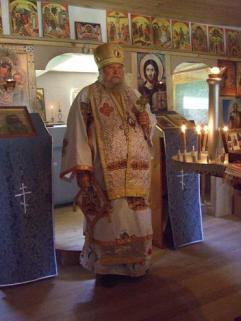 In his sermon (audio recording), Vladyka Andronik reminded the people to stay faithful to the Holy Orthodox Church in these difficult times.
In his sermon (audio recording), Vladyka Andronik reminded the people to stay faithful to the Holy Orthodox Church in these difficult times.
Vladyka also spoke regarding distancing ourselves from the world, seeking spiritual nourishment in monasteries (audio recording), for the salvation of our souls.
After Liturgy, Vladyka Andronik blessed the new portal Cross and kupol at the hermitage entrance.
The work was carried out by master craftsman and benefactor Dmitri Kichakov.
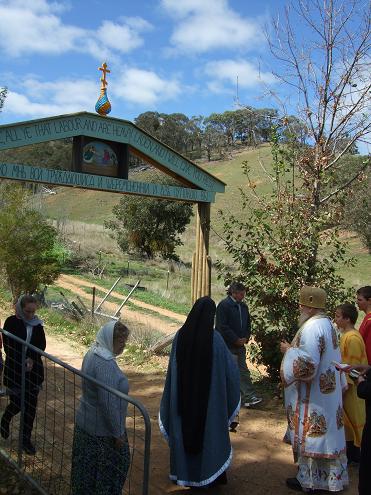
Sunday, September 14, 2014
Archbishop Andronik’s visit to Australia
Schedule for hierarchal services with Archbishop Andronik of Canada and Syracuse.
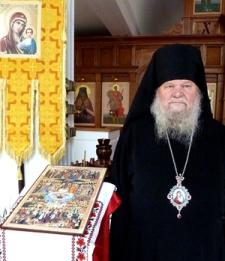
Services at Annunciation Hermitage
- Friday, 19th September: 6 pm Vespers and Matins
- Saturday, 20th September: 10am Hierarchal Liturgy
Services at the Parish of the Protection of the Mother of God, Yarraville
- Saturday, 20th September: 6 pm Vigil (Nativity of the Mother of God)
- Sunday, 21st September: 10 am Hierarchal Liturgy
- Friday 26th September: 6 pm Vigil (Elevation of the CROSS)
- Saturday 27th September: 10 am Hierarchal Liturgy
Services at the Community of the Tabinsk Icon of the Mother of God
- Saturday, 27th September: 4 pm Vigil with Akathist to the Tabinsk Icon
- Sunday, 28th September: 10 am Hierarchal Liturgy
All faithful are welcome to join the services with Archbishop Andronik.
Please contact the various communities directly for more information.
Saturday, September 13, 2014
Prayers for God’s blessing upon us at the Church New Year
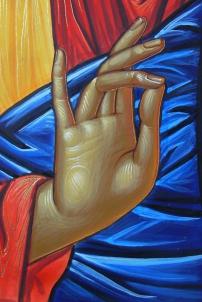 Today, the Holy Church today celebrates the new year. It does this with prayer.
Today, the Holy Church today celebrates the new year. It does this with prayer.
Who does not desire health, prosperity, peace, and a good life? All these things come from God, so He is the one we must ask for them:
O unoriginate Word and Son, Who is united with the Holy Spirit, Creator and Fashioner of all things visible and invisible: bless Thou the crown of the year, preserving the multitude of the Orthodox in peace, through the prayers of the Theotokos and of all Thy saints.
Stikhira at “Lord I have cried”.
God is, indeed, the one who gives everything to all, regardless of whether men appreciate this fact or not:
God belongs to all free beings. He is the life of all, the salvation of all - faithful and unfaithful, just and unjust, pious and impious, passionate and dispassionate, monks and seculars, wise and simple, healthy and sick, young and old — just as the diffusion of light, the sight of the sun, and the changes of the weather are for all alike; ‘for there is no respect of persons with God’.
St John Climacus: The Ladder of Divine Ascent
All men live and are warmed by rays of the spiritual Sun - God. They all enjoy various blessings, which some thank God for. Others again appear to think blessings are their “human right”. The Church teaches us that God is the source of blessings, and that He can withdraw these from us at anytime - whether due to our ingratitude, or to test us, or even to glorify us.
If all things have been made by God and for His sake, then God is better than what has been made by Him. The one who forsakes the greater and is engrossed in inferior things shows that he prefers the things made by God to God Himself.
St Maximos the Confessor: 400 Chapters on Love I:6
Therefore, the Christian must remember that spiritual blessings - faith and virtue - are higher than all earthly things. Only spiritual goods will help us unite us with the Creator, and only these blessings can last us all the way to eternal life. We reach eternal life with God by the path of Christian life in the body on earth. The Church prays that we make a new-years’ resolution to set out on the spiritual path:
O Master, God of all things, lead through this year which beginneth those who adorn themselves with divinely beautiful spiritual works, and who hymn Thee with faith.
Canon, ode 3.
O ye Orthodox people who now begin the year, let us set a beginning to our hymns to Christ Who reigneth over the everlasting Kingdom; and let us piously chant: O God of our fathers, blessed art Thou!
Canon, ode 7.
Nevertheless, the Church, our Mother, knows that Her children often go astray. She calls out to the Mother of God to help us sinners:
To the path of repentance guide us who are ever inclined toward evil and trackless places, and who anger our all-good Lord, O blessed Mary who knewest not wedlock, thou refuge of despairing men and habitation of God.
Sedalen
Through the prayers of the Most-Holy Mother of God, of St Symeon the Stylite and his mother, Martha, of the 40 women martyrs and all the Saints, may the coming year be blessed with spiritual goods for us all!
Read also the edifying spiritual periodical in English from the Convent of the Holy Angels, Greece.
Thursday, September 11, 2014
The Beheading of St John the Baptist
![]() A prophet is killed because of his love of truth and virtue! Today the Church celebrates the death of St John the Baptist, solemnly urging all its children to fast this day. This is to remind them what is the end of the pleasures of this life, particularly those “pleasures” that are illegal and sinful. Christians should live for the future life, for life with God in Heaven.
A prophet is killed because of his love of truth and virtue! Today the Church celebrates the death of St John the Baptist, solemnly urging all its children to fast this day. This is to remind them what is the end of the pleasures of this life, particularly those “pleasures” that are illegal and sinful. Christians should live for the future life, for life with God in Heaven.
The children of the Church prove their love for God by fasting this day, and fasting from unlawful and sinful “pleasures” all the days of their life.
John accused Herod on account of his evil deeds, but especially concerning Herodias. She was Herod Antipas’ brother’s wife, whom he had seized and illegally wed. John said to him, ‘It is not lawful for thee to have the wife of thy brother.’ Finding the reproach, or rather, the reproaches, unbearable, Herod added this to his other evil acts, that he shut up John in prison.
St Gregory Palamas, 14th century
Herodias was angry. She was knew she was committing adultery, but the law of God meant nothing to her. How many people today inwardly say the same? How many adulterers today would not kill the Prophet of God, if given the chance?
She, by her own efforts and wiles, accomplished the deed and saw it through to its conclusion…She inwardly cherished malice against John….She wanted him dead…For she figured that there was no other way to silence what she took to be an accusation against herself. The abomination in which she was involved did not have just one or two aspects. It was highly complicated. It was a matter of adultery, the most shameful of sins. And it was adultery by none other than the brother of the adulteress’ husband, the father of her daughter…Even if the husband had died, his brother could not marry the widow according to the law of Moses….Herod, furhtermore, did not perpetrate this shameful deed secretly or with any sort of dissimulation. He accomplished the abomination openly and shamelessly.
St Gregory Palamas, 14th century
Hardened sinners always hate their accusers. A sinner always hates the person who hinders him in indulging his sinful passion. And those around them, indulging in the pleasures of life, become blind to truth and ready to follow the most lawless suggestions!
Hearken, you virgins, or rather, you wives also, as many as consent to such unseemliness at other person’s weddings - leaping, and bounding, and disgracing our common nature. Hearken, you men too, as many as follow after those banquets - full of expense and drunkenness - and fear the gulf of the evil one. For indeed, so mightily did he seize upon that wretched man Herod just then, that the latter swore even to give the half of his kingdom. This is what Mark states: “He swore unto her, such was the value he set upon his royal power,; so was he once for all made captive by his passion, as to give up his kingdom for a dance.
St John Chrysostom, 4th century
The princess dances, and the better she dances, the more evil it is. For it is shameful for a princess to be skilled at doing something unbefitting…Satan dances by means of the young girl.
Blessed Theophylact, 11th century
Christians - beware of luxury, pleasures, dancing, good food and wine - that they do not weaken your love for God! St Moses the Black (28.August/10 September) explains why these are dangerous:
These four lead to fornication: (1) eating and drinking; (2) oversleeping; (3) negligence; and (4) decoration of clothes. If thou dost wish to make thy repentance before God, beware of living in luxury. For this stimulates all passions and dispels the fear of God from the heart. But control af the body diminishes the effects of other desires. Desire of food awakens the passions and emotions. So, again, they are controlled by fasting.
St Moses the Black (the Robber) of Egypt, 4th century
The Holy Church teaches her children to keep fasting in order to prevent vice developing in their souls. The effective medicine of fasting has been proven by centuries of ascetics. And history tells us that whenever emotional sensuality, laxity and luxury starts to creep in, sin is not far away…In light of this teaching of the Holy Church, it is not difficult to explain from where the lawlessness of modern “culture” has come. Returning to Herod’s birthday party, we read:
The whole theatre was devilish. For first, it was made up of drunkenness and luxury, whence nothing helpful could come. Secondly, the spectators in it were depraved, and he that gave the banquet the worst transgressor of all. Thirdly, there was irrational pleasure. Fourthly, the damsel, because of whom the marriage was illegal, who ought even to have hid herself, as though her mother were dishonored by her, comes making a show, and throwing into the shade all harlots, virgin as she was. And the time again contributes no little to the reproof of this enormity. For when Herod ought to be thanking God, that on that day the Lord had brought him forth from the womb to light, then he ventures upon those lawless acts. When one in chains, that is John, ought to have been freed by Herod, then he adds slaughter to bonds
St John Chrysostom, 4th century
Who would not have shuddered to see that sacred head, dripping blood, set forth at the feast? But not so the lawless Herod, nor the woman more accursed than he. For such is the nature of the unchaste among women; none so audacious and so savage as they. For if we shudder at hearing these things, what must we suppose of the effect of that sight at the time? What of the feeling of those who sat with him at meat, on seeing blood dropping from a newly-severed head the midst of the revel?
But as for that bloodthirsty woman, and fiercer than furies, she had no feeling at that spectacle. But she even took delight in the dripping gore of the slaughter; yet if nothing else, surely the mere sight, it was to be expected, would effectually turn her cold. But no such feelings had she, the murderess, and full of thirst after the prophet’s blood. For such is the nature of whoredom. It makes men not wanton only, but murderous also. Those women at all events, who desire to commit adultery, are prepared even tfor the slaying of their injured husbands - and not one only, nor two, but ten thousand murders are they ready to venture upon. And of this sort of tragic there are many witnesses.
St John Chrysostom, 4th century
Why does the Church take such a strict view of dancing?
…because it harms morality…anyone who breaks the commandments of God, kills his soul. Amongst the commandments, there is the very important 7th commandment, which prohibits sins against morality: “Do not commit adultery”. This commandments it binding not only for monks, but also for lay people who wish to be true Christians and save their souls. One cannot think, as many unfortunately do now, that a moral life is required only of monks, who deny themselves marriage, and that lay people may live in moral decadence, however they please….True Christianity…allows marriage, a lawful marriage, blessed by the Church - every other kind of bodily cohabitation in the two variants of adultery and fornication is seen by the Christian Church as a heavy sin, equal with murder and denial of the faith, as life itself shows us it is. Therefore it is not surprising that the Church condemns anything that leads to these sins.
We need to evaluate dancing from this point of view. If the dancing is such that it threatens morality, the Church must condemn it:
Archbishop Averky (Taushev) 20th century
The holy and ecumenical [6th] Council universally prohibits so-called pantomimes and their theatrical exhibitions; afterwards, in keeping with this, also the spectacles of wild-animal fury and of hunters’ prowess, and the execution of dances on the stage. If anyone flouts the present Canon, and gives himself over to any of the things herein prohibited, in case he is a clergyman, let him be deposed from office; but in case he is a layman, let him be excommunicated.
51st Canon of the 6th Ecumenical Council.
…Furthermore, the public dances of women, which are calculated to wreak great harm and injury. Furthermore we dismiss also the dances and ritualistic ceremonies performed by men or women in the name of what are falsely called gods among Greeks, after an old custom which is alien to the life of Christians, at the same time decreeing that no man shall put on any feminine costume, nor shall a woman put on any that befits men. But neither shall anybody put on comic, or satyric, or tragic masks; neither shall anybody shout the name of abominable Dionysus while engaged in squeezing grapes in the wine-presses; nor, when pouring the wine into the casks shall they provoke laughter by a show of ignorance or of vanity, by producing the effects of demoniacal delusion. As for those who from now on attempt to carry out any of the aforesaid improprieties, while well aware of what they are doing, if they should be clergymen, we command that they be deposed from office; but if laymen, that they be excommunicated.
62nd Canon of the 6th Ecumenical Council.
These strict canons are as binding for Christians as the ones prohibiting heresy! This is how dangerous the holy fathers consider improper feasting, luxury, acting and dancing for the immortal Christian soul.
For every true Christian these kinds of women’s dances should be disgusting, because they involuntarily remind of the dance of Herodias’ daughter, whose victim became “the greatest one born of women” - the forerunner and Baptist of the Lord, St John.
Archbishop Averky (Taushev) 20th century
For where dancing is, there is the evil one. For neither did God give us feet for this end, but that we may walk orderly: not that we may behave ourselves unseemly, not that we may jump like camels (for if even they too are disagreeable when dancing, much more women), but that we may join the choirs of angels. And mark too the very mode of asking. “Give me here John the Baptist’s head in a charger.” Dost thou see how Herodias was lost to all shame, and became altogether the devil’s?
St John Chrysostom, 4th century
Society no longer agrees with the Church in upholding healthy morality. However, this cannot change the standard set by the Church for her children, which She has set out of love for their immortal souls:
The teaching of the Church, founded on the the Saviour’s coming to earth, will always remain unchanged. The true Church cannot adapt to the spirit of the age and tickle people’s passions. And if modern Christians do not wish to hear the voice of the Church, then this makes it worse for themselves…It is not for the Church to follow after life - but for life to follow the Church. It is not for life to judge the Church and Her teaching and rules, but rather, the Church is given right to judge life by Her Divine Founder, our Lord Jesus Christ, who said: “if [a sinner] neglect to hear the church, let him be unto thee as an heathen man and a publican”, and who also gave the servants of the Church the awesome power to bind and loose the sins of people.
Archbishop Averky (Taushev) 20th century
God’s judgement came upon Herod and Herodias swiftly. They were exiled and ended their days in misery and poverty in a foreign land. As for Salome, the dancing daughter, her death was conformed by her sin:
Salome set out across the frozen river Sikaris one day. The ice broke, and she fell into the water up to her neck. Shards of ice jammed around her neck and she struggled, treading her feet in the water, as she once danced at the court of Herod. She was unable either to raise herself up or to sink down, and a shard of ice severed her head. The water carried her body away, and her head was brought to Herodias on a platter, as was once the head of John the Baptist. Behold, how terribly a death resembles the sin committed.
St Nikolai (Velimirovich) 20th century
The glorious beheading of the forerunner was part of God’s dispensation, that he might proclaim to those in hades the coming of the Saviour. Let Herodias, who demanded the iniquitous murder, therefore lament; for she loved not the law of God nor the age of life, but rather this false and transitory one.
Kondak, Beheading of St John the Baptist
Through the prayers of the Holy Prophet, Forerunner and Baptist John, Lord Jesus Christ, our God, have mercy on us sinners, living in the modern, decadent world!
Monday, September 8, 2014
Letter to a Troubled Parishioner
If a man say, I love God, and hateth his brother, he is a liar: for he that loveth not his brother whom he hath seen, how can he love God whom he hath not seen? 1 John 4:20
Grace unities. The enemy divides. Active prayer, spiritual life both at home and in church, and the Church Sacraments unite us to God.
However, without us realising, the devil fools us through our passions. We start to dislike one another, become divided, run away from each other…and separate ourselves from God…
The following is a letter written [many years ago]to a person who had difficulties with his parish priest and stopped attending services. Then he contacted another priest in a different city. The letter attempts to provide a deeper insight to this common occurrence, hopefully providing an “understanding” that will teach us to endure a little more.
To be able to see beyond our neighbour’s petty faults, and deeper into our own souls, which the Church is trying to purify, is something to which we must all strive.
Fr Andrew Kencis
Dear *****
May God bless you and your family!
I must explain to you my delay in replying. First off, just after Nativity my back “gave out” and I spent an entire week literally in bed! Then I came down with that incredible flu and spent another week in bed. But these were just the side issues. The main reason for the delay was something of much more importance.
Your letter upset me greatly; saddened is more the appropriate word. And I had intended to write several times but could not bring myself to put the words to paper, for fear of not being able to word my letter properly in a way that would be entreating and spiritually beneficial to you (this is the only concern that a priest must have: the spiritual benefit of those whom God has sent to a priest to minister to.)
But the time has come to write….
You wrote that you have great respect for our Metropolitan and you credit your still being “an Orthodox believer” to him, although you do not attend your “local Church.” I have to remind you of some quotes from our Church Fathers:
“where there is the Bishop there is the Church”
and
“He who does not have the Church for its Mother does not have God for his Father.”
And from Saint Paul,
“Do not turn away from the gathering of the brethren”.
You have to realize this fact that not attending your local church is separating you from the Church. The church is the only place where we can receive the Sacraments of Christ that were giving to us by Him to heal, to strengthen, to comfort. In the prayers that we are supposed to say before coming to Holy Communion we read:
“… I approach Thee, O Christ God, … as one trusting in Thine ineffable goodness, and that I may not by much abstaining from Thy communion become the prey of the spiritual wolf…”
And in another place
“…that Thou mayest remain, as Thou hast said, with me, a thrice-wretched one, lest the deceiver finding me without Thy grace, craftily seize me, and having beguiled me, draw me away from Thy deifying words….”
Bearing this in mind, you can see how important is not only our attending services but our direct participation in them, in other words, actively praying and receiving communion. This must be our only purpose for attending services: to receive the benefits that God has giving to us for working out our salvation.
 Our common enemy the devil (who people frequently forget) loves to “hide” behind people using personal weaknesses and prejudices (even the Priest’s) to stir things up! He continually provokes and pushes us to division. Examples of this are so numerous from the lives of Saints and from our own experience! Yes, there will be troubles; how can there not be! Saint Cyril of Alexandria writes
Our common enemy the devil (who people frequently forget) loves to “hide” behind people using personal weaknesses and prejudices (even the Priest’s) to stir things up! He continually provokes and pushes us to division. Examples of this are so numerous from the lives of Saints and from our own experience! Yes, there will be troubles; how can there not be! Saint Cyril of Alexandria writes
” you say that you are a sinner, then do not be amazed that you sin! How can one being sick not show signs of his illness!”
I would add, how can your brother in Christ who is also “sick” not show signs of his illness? This is where the Church tells us to
“bear one another’s burdens for the sake of Christ”; “correct such a one in the spirit of meekness considering yourself lest you also be tempted!”
and many other admonitions. It tells us this in order that we would not be perplexed at
“the fiery trial that comes upon us,” (from the Epistle of Saint Peter).
You had problems with Father ***** and stopped attending your spiritual home. Then because you are a believer and truly grieve over this separation, you contacted me for another lifeline (so to speak) to your home, because you felt that you could trust me, and have a certain positive opinion about me. But I can give you the names and phone numbers of people in **** who trust and have a high opinion of Fr. ***** and despise me! Let me try to explain the reason for this…
When we stand in the church we stand before God. We all know this. But what some of us forget is that we stand immersed in His Divine Presence. This “Grace” illumines us, purifies us, comforts us; also it gently encourages us to leave off certain things, in the depths of our hearts, which, although we do not even realize or want to give up, are contrary to pious living. This starts an “unseen” pressure in a person. Saint Paul writes in one of his epistles
“I see a war in my members”.
This occurs on a very subtle level, but the results are not subtle! What happens is that we start to feel uncomfortable with certain sermons or phrases (they even “burn” us!) and then the evil one seeing our reluctance starts to encourage us to blame someone else for this discomfort, when actually it is from inside of ourselves. Then we are ready for any excuse to lash out at the one we believe is causing the pain, when in fact it is from within ourselves.
Please hear me! My parish has suffered immensely because some people would not acknowledge this! I have been called so many names and had so many lies said about me that even my relationships with the other clergy have suffered, (but not the Metropolitan because he understands this trick of the evil one). Granted, I made a lot of my own problems because of my personality. But if you look at my parish now you will see that it is filled with those who saw beyond my faults and know that they come to Church not because of me or anyone in the parish. They come only for the healing, life-giving benefits that can only be given in the Church. I urge you to come back for this reason only and no other.
I just found out “sideways” that Bishop *** is coming for the Unction Service, the “healing service”, sometime during March. In Unction our sins known and unknown are forgiven, if we only approach with even a little remorse in our hearts. We as parents are ready to do this for our children; how much more is God! Try to talk with the Bishop.
 Next, I have to address your request for prosphora. I did cut you one each Sunday since I received your letter, but could not bring myself to mail it. Again because of the reasons mentioned above.
Next, I have to address your request for prosphora. I did cut you one each Sunday since I received your letter, but could not bring myself to mail it. Again because of the reasons mentioned above.
You must understand a prosphora is blessed on the altar of God; only baptized Orthodox Christians may eat of it. Also, those who pull away from the church have no right to eat of them. Also, you wrote, “Do you still have access to them?” I am a priest! How could I not! A priest controls who gets them and who does not, as they are something sacramental and only he has the right to distribute them initially.
Enclosed you will find a Prosphora.
Also, please find enclosed a book that I sincerely hope you will read. Also pray before you read it, to let its words soften your heart.
I wrote this letter very boldly; but I had no other choice, you cannot survive outside of your spiritual home. The question of attending the other “so-called” jurisdictions for a member of the Russian Church Abroad is totally out of the question. The reasons are of a matter of the faith, not “politics” or any other such nonsense. When these reasons are explained then it is plain to all that it is not out of pride, but out of fear of turning away from our God!
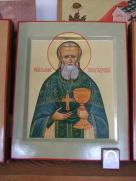 I ask for your forgiveness in my delay in writing you. I will continue to help in anyway I can, if you want me to. Please realize my only concern is your and your family’s salvation and peace of heart.
I ask for your forgiveness in my delay in writing you. I will continue to help in anyway I can, if you want me to. Please realize my only concern is your and your family’s salvation and peace of heart.
With Love in Christ,
Priest Andrew Kencis
Here is a quote from my latest schedule of services:
Up till now you have not learned to love your neighbour. You answer men’s dislike towards you by dislike on your part. But do the contrary; answer other’s dislike by heartfelt goodwill and love; the more dislike you see towards you, the more you should love. Dislike is a malady, and a sick person should be more pitied, should be shown greater care and greater love, exactly because he is ill. Do you know that the bodiless enemy uses his craftiness against all, infects all with the poison of his hatred? And you too, are not exempt from his craftiness. Do not serve him, then with the spirit of enmity, but serve the God of love with the utmost zeal. Remember that God the Word died for your brethren.
Taken from: “My Life in Christ” the diary of Saint John of Kronstadt.
Article used by permission of the author.
St. Vladimir’s Russian Orthodox Church in Edmonton, Alberta
Friday, September 5, 2014
Orthodox family life: A beautiful memory
 I visited an Orthodox family a few years ago. Father, mother, and four teenage children welcomed me so warmly that I felt I had become a part of their close-knit family. It seemed the word “stranger” did not exist for them. There was no awkwardness in their conversation, no pretense or vain show-off - instead, there was endless warmth and love. We conversed on topics of common interest. The lampadka remained lit in the corner of the room, where there were many icons and an analogion with books.
I visited an Orthodox family a few years ago. Father, mother, and four teenage children welcomed me so warmly that I felt I had become a part of their close-knit family. It seemed the word “stranger” did not exist for them. There was no awkwardness in their conversation, no pretense or vain show-off - instead, there was endless warmth and love. We conversed on topics of common interest. The lampadka remained lit in the corner of the room, where there were many icons and an analogion with books.
In the evening, the father suddenly said: “Prayers”! One of the daughters immediately ran to the various rooms to fetch her siblings. One by one they came wandering into the common room, while the father started:
Through the prayers of our holy fathers, Lord Jesus Christ our God, have mercy on us! Glory to Thee o God, glory to Thee….O Heavenly King, Comforter, Spirit of Truth, Who art everywhere present and fillest all things…
Soon one of the girls took over. Mother had piously covered her head with a scarf. The youngest girl ended the evening prayers, and then the family broke out in song with the troparions to all their patron saints and the saint of their parish church. They were not great singers, but they knew all the words - speaking to the saints as to their extended family!
After these ten minutes, all quickly helped prepare an evening snack, over which we continued our conversations. The girls soon wandered off to their rooms to continue their girls’ activities and their homework, perhaps? School morning tomorrow…!
![]() To my astonishment, at six o’clock in the morning, the scene repeated itself. “Prayers! Come on, get up”, I could hear not far away from the guest room. A few minutes later, three girls, mother and father, and myself, still half-asleep, stood in front of the icons, and mother now started the prayers. The readers alternated, each knowing when it was her turn. The youngest daughter finally wandered in, still in her pyjamas…
To my astonishment, at six o’clock in the morning, the scene repeated itself. “Prayers! Come on, get up”, I could hear not far away from the guest room. A few minutes later, three girls, mother and father, and myself, still half-asleep, stood in front of the icons, and mother now started the prayers. The readers alternated, each knowing when it was her turn. The youngest daughter finally wandered in, still in her pyjamas…
Prayers were nearly finished. Father announced: “Reading from the Epistle of St Paul to the Corinthians!” and we listened to the Epistle and the Gospel readings for the day. The entire session took only 15 minutes - the readers knew these prayers, and had no need to go slow…
Father rushed off to work. I shared breakfast with more or less awake and enthusiastic children. One of the oldest turned to me to explain:
“It’s because our dad lived in a monastery for a while when he was young - we live sort of like in a monastery, with prayers every day. But we are used to it, I actually like it and can’t imagine living in a different way”
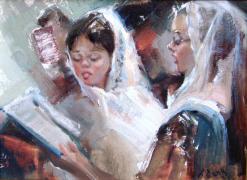 How blessed Orthodox family life can be!
How blessed Orthodox family life can be!
On Saturday night, we all went to church together for the evening service. The girls sang. Everyone had Confession. They then asked forgiveness of each other, for any unintended hurts that might have occurred.
Next morning, there were no common prayers at home, as all were off to church. The girls ran in and out of each others’ rooms, asking to borrow such-and-such a skirt and “the blue silk scarf, because it is a day for the Mother of God!”. We arrived at church nearly on time…
Time proved that this way of life was neither without fruit nor a forced exercise. All the children remained close to the Church, and they converted their future spouses to the holy Orthodox faith. They were used to fasts and feasts, prayer in Church and at home, and the Mysteries accompanying every important moment of their lives.
More on the place of the icon corner in an Orthodox home.


